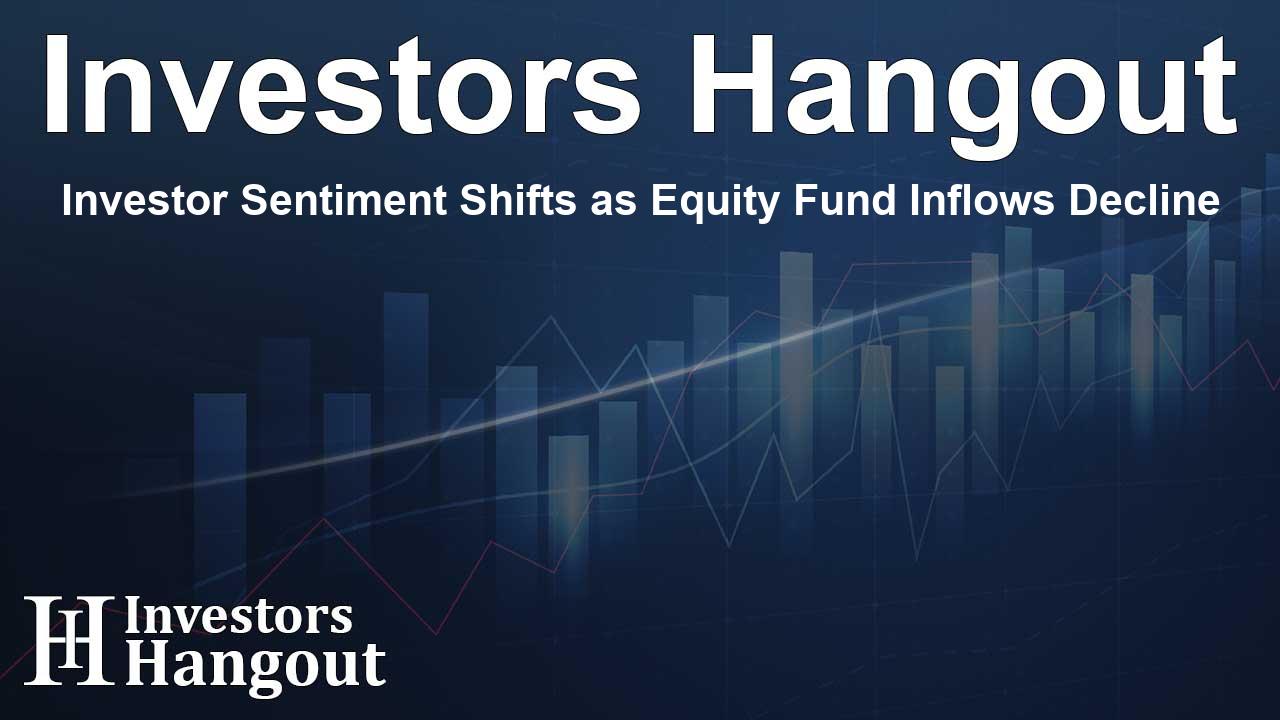Investor Sentiment Shifts as Equity Fund Inflows Decline

Investor Sentiment Shifts Amid Market Volatility
Recent trends have revealed a notable decline in demand for global equity funds as we move into the new year, primarily driven by rising U.S. Treasury yields. This shift in sentiment led to increased caution among investors, prompting many to take profits during the typically subdued period of year-end trading.
Equity Fund Inflows Experience Significant Decrease
According to data provided by LSEG Lipper, global investors injected a net total of $4.93 billion into equity funds. This represents an astonishing 86% drop in inflows compared to the approximately $35.1 billion poured into these funds in the previous week. Such a drastic shift illustrates the evolving investment landscape as higher bond yields prompt shifts ?? investor preferences.
MSCI World Index Observes Increased Caution
The MSCI World Index, which experienced a remarkable surge of over 15% in the previous year, is now facing a 1.5% decline this week. Many investors, perhaps wary after last year's stock market highs, decided to secure gains, leading to this recent downturn.
Impact of Rising Bond Yields on Equity Interest
The upward trend in bond yields has dampened enthusiasm for equities. The U.S. 10-year Treasury yield recently escalated to 4.641%, marking its highest level since May 2. Such developments have had a ripple effect across markets, as investors reassess their portfolios amidst changing economic signals.
Region-Specific Trends in Equity Fund Purchases
Breaking down the investor behavior by region, European, Asian, and U.S. equity funds attracted net purchases of $2.25 billion, $1.64 billion, and $490 million respectively. However, it's essential to note that these inflows also diminished from the previous week's figures in all three regions, indicating a widespread cautiousness among equity investors.
Sectoral Withdrawals Signal Investor Hesitation
A particularly telling trend is the outflow from sectoral equity funds, which has now reached its fourth consecutive week with a total withdrawal of $2.35 billion. The technology, healthcare, and industrial sectors faced the brunt of this move, accumulating withdrawals of $453 million, $375 million, and $346 million respectively.
Money Market Funds Gaining Popularity
In contrast to the declines observed in equity funds, money market funds saw a resurgence in popularity, collecting $72.99 billion in inflows. This marks the largest weekly influx into safer investment vehicles in four weeks, showcasing a clear preference for less volatile options among cautious investors.
Bond Funds Show Modest Resilience
In the realm of bond investments, global bond funds report modest inflows as investors sought safety in government bond funds worth a net of $878 million. Additionally, loan participation funds attracted $320 million during this intense market adjustment, while corporate bond funds experienced outflows amounting to $573 million.
Commodities Facing Selling Pressure
Within the commodities sector, investors moved away from energy sector funds, selling off $141 million worth, continuing a trend of four weeks of selling in this area. Similarly, gold and precious metals funds faced outflows of approximately $149 million, starkly contrasting the net purchases of $1.25 billion witnessed in the preceding week.
Emerging Markets Show Continued Withdrawal Trends
Examining the emerging markets segment, data covering 29,579 funds points to a continuation of withdrawal trends, marking the eighth consecutive week of net sales totaling around $1.39 billion. Additionally, bond funds under this category experienced a net outflow of $870 million.
Frequently Asked Questions
What caused the decline in global equity fund inflows?
The decline is largely due to rising U.S. Treasury yields which have led investors to be more cautious, resulting in profit-taking during year-end trading.
How much did global equity funds attract recently?
Global equity funds attracted a net total of $4.93 billion, a significant decrease from approximately $35.1 billion the previous week.
What is the current status of the MSCI World Index?
The MSCI World Index has decreased by 1.5% this week after a substantial increase of over 15% the previous year.
How did regional equity funds perform?
European, Asian, and U.S. equity funds gathered net purchases of $2.25 billion, $1.64 billion, and $490 million, respectively, though all saw decreased inflows from the previous week.
Are money market funds becoming more popular?
Yes, money market funds attracted $72.99 billion, marking the largest weekly inflow in this category in four weeks, as investors seek safer investments.
About Investors Hangout
Investors Hangout is a leading online stock forum for financial discussion and learning, offering a wide range of free tools and resources. It draws in traders of all levels, who exchange market knowledge, investigate trading tactics, and keep an eye on industry developments in real time. Featuring financial articles, stock message boards, quotes, charts, company profiles, and live news updates. Through cooperative learning and a wealth of informational resources, it helps users from novices creating their first portfolios to experts honing their techniques. Join Investors Hangout today: https://investorshangout.com/
Disclaimer: The content of this article is solely for general informational purposes only; it does not represent legal, financial, or investment advice. Investors Hangout does not offer financial advice; the author is not a licensed financial advisor. Consult a qualified advisor before making any financial or investment decisions based on this article. The author's interpretation of publicly available data shapes the opinions presented here; as a result, they should not be taken as advice to purchase, sell, or hold any securities mentioned or any other investments. The author does not guarantee the accuracy, completeness, or timeliness of any material, providing it "as is." Information and market conditions may change; past performance is not indicative of future outcomes. If any of the material offered here is inaccurate, please contact us for corrections.